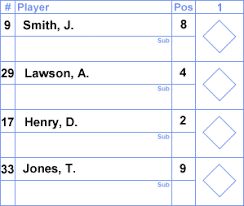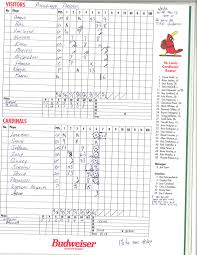January 2015, Spring Semester-
Can't tell the players without a scorecard.We'll track daily participation with baseball-style scorecards.
But our game's much easier than the national pastime, all you have to do to get to 1st base is show up for class.

Each class date is a column or "inning" on the scorecard. Simply showing up to class gets you to 1st base. Mark your scorecard accordingly. Now you're eligible to score runs (runs=participation points). Here's how:
How to score your first run each day.You can come around from 1st base to score your first run if, since last class, you
- posted a relevant Factual Question (FQ) about the day's assigned text for possible inclusion on the daily quiz;
- posted a relevant Discussion Question (DQ) for class or group discussion;
- posted a link to something relevant online or in print (a YouTube video, an article, a book...);
- posted a summary of your group's discussion last class (that's called being the AUTHOR);
- posted a comment on the AUTHOR summary of your group's discussion last class;
- posted a comment on someone else's post;
- posted all the quiz and discussion questions you and your peers came up with in class last time.
You can also come around to score your first run of the day if you
- started the computer/projector etc. when you first arrived at our classroom today;
- serve as today's Bell-ringer to let us know when it's time for the quiz, discussion, floating (see below) etc.;
- ace today's daily quiz;
- serve as your group's discussion FLOATER, MODERATOR, or SCOREKEEPER today. (FLOATERS visit other groups during discussion time, MODERATORS keep group discussion flowing and orderly, SCOREKEEPERS certify, tally, and post each group member's runs totals, today and to date);
- Copy and paste all the quiz questions into a Quiz Review/study guide post prior to an upcoming exam;
- Participate in a PERIPATETICdiscussion (see below);
- Write your group's FQs or DQs on the board;
- Do something else that impresses the professor;
- [Your idea here.]
How to score more runs each day. Simply do more of the same, especially posting multiple comments, questions, links, etc.; and persuade your group to select YOUR question(s) for today's quiz or discussion.

Daily routine
When you come to class, immediately join your group and begin discussing the proposed FQs (for the daily quiz) & DQs (for class & group discussion). Select at least one of each, and have a group member write them on the board.
Then I'll talk.. we'll do the quiz... we'll have class discussion... and finally, group discussions (with floaters).
If it's nice out, some of us may decide to have a Peripatetic discussion. Grab a summary sheet, pick a moderator, and go philosophize. Just be back ten minutes before the end class, to mark your scorecard.
Those who choose not to walk-&-talk, or who are physically restricted, can stay in for sedentary group discussion or an alternative assignment.
Before we dismiss each day, select your group's Author. Authors, post a draft discussion summary before you leave, during the last ten minutes. You can edit and polish later, at your leisure.

Daily Quiz
We'll do daily quizzes of six questions, composed of questions submitted, discussed, and chosen by all of us. Then, we'll have three exams during the semester composed of questions based on the quizzes.
Why? Because philosophy is all about the questions, and because "frequent quizzes can deepen learning" (see "How to Study" below).
And note: "One reason scientists suspect that studying in pairs or groups can be helpful is that students are forced to talk to one another about the material-or better yet, argue about it... [this] deepens learning more than passively rereading or reviewing the material" alone. Hence, the rationale for our quiz-and-collaboration course format.
Besides, it's fun.

Peripatetics
The original
peripatetics were Aristotle's students at the Lyceum, back in the day. Legend has it that they didn't sit indoors in orderly rows like students nowadays, but instead roamed the grounds walking-and-talking philosophy. I like their style, apocryphal or not... which is why I'm developing a
Study Abroad course that will involve walking and talking in England beginning in the summer of '16. Stay tuned for more info on that.

Bonus Incentives
- If you come to every class (allowing for two "personal days" off) and score at least one run per inning throughout the semester, you’re EXEMPTfrom exam #3 (you’ll earn a default “A” on it);
- If you average 95 on the first two exams, you're exempt from exam #3
- If you lead your group in runsor win one of three wildcardspots ("wildcards" are those who don't lead their groups but still finish with the next-highest runs totals in the class) you’reEXEMPT from exam #3 andfrom the 1,000-word final report blog series (you can do a single 250-word post instead);
- If you lead the entire class in runs, you’re EXEMPT from exam #3 and from a final report, period. (But you may still do an extra-credit presentation if you wish.)


One member of each group will be its designated Author each day, responsible for promptly posting a paragraph-length summary of that day's group discussion for others to reply to and comment on ("Promptly"=same day, ASAP). When you're a "DA" you can circle the bases and score a participation run automatically, no need to post additional questions, comments, and links for your first run.
On Peripatetic Days (more on this to be announced), groups and sub-groups will need also to turn in a separate sheet indicating travel routes and summarizing discussions.
Isn't this fun?! Yes, it is. Trust me. We'll not begin scoring our daily participation officially until everyone is on board and comfortable with the process - or at least has identified a group buddy who'll hold your hand and help you through "Spring Training."
And speaking of buddies & hand-holders: every group should identify their cleverest techie.
That person will know more about the arcana of cyberspace than I. Please make him or her (not me) your go-to person when you have technical issues. If they can't fix your problem, sweetly ask one of your group authors to post your questions, comments, and links for you.
This may sound complicated, but it's really not. Here's a possible sample reply to a hypothetical imaginary post from your group's designated author, on a given day... Tuesday, say):
AUTHOR 1 ("Kathy"): Today in class we discussed the first chapter in Campbell's Bioethics: The Basics, "What is Bioethics?" Of the several interesting bioethical questions posed by Campbell in the very first paragraph, our group seemed most interested in this one: "Have parents the right to use science to design the kind of children they want?" Members of the group were split. Sally said yes, Bill said no. Their reasons, briefly, were... [blah blah] But we did all agree that "designer children" should never be allowed to deprive any future person of life, liberty, and the pursuit of happiness. (Etc.)
"Kathy" gets to circle the bases on the scorecard and score her first participation run of the day.
Next class day, Thursday, arrives. You show up, and thus get to draw a line from Home to 1st base. Your little base-running avatar is on his or her way!
Here's what you posted in reply to "Kathy" before today's class:
YOU ("Philo"): I was one of those who objected to the whole idea of "designer babies," I find the idea repugnant. What if my parents had designed me that way? Wouldn't I feel cheated or in some way denied my full freedom and autonomy? Anyway, here's a Factual Question about today's assigned reading, ch2:
FQ- What is the best-known "consequentialist" theory? (Answer: Utilitarianism)
And here's a Discussion Question that I hope we'll talk about in our group this afternoon:
DQ- Do you agree with Peter Singer that we should always seek to minimize pain and suffering, for people AND animals?
And here's a fun link I found about Peter Singer: http://----
And that's all it takes to circle the bases and score your first run. Post some more, in reply to other group authors, and collect more bases. Easy and fun!
See how easy that is? And it'll just get easier. And more fun.
No comments:
Post a Comment